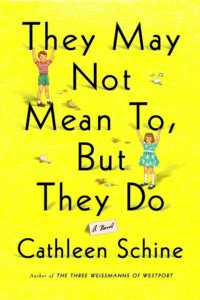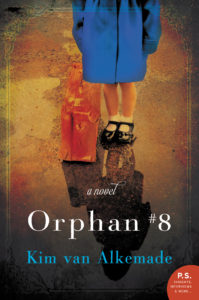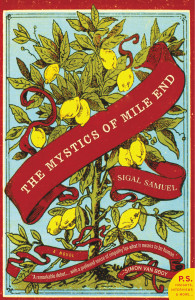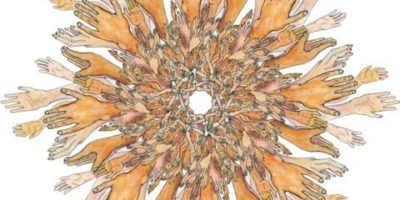Three New Novels on Family, on Betrayal, on Mystery
 They May Not Mean To, But They Do (FSG, $26) by Cathleen Schine takes its title from a Philip Larkin poem: “They fuck you up your mum and dad / They may not mean to, but they do.” This hilarious yet deeply affecting novel chronicles the intergenerational ties among the members of the Bergman clan — aging matriarch Joy, who refuses to retire from her museum job and insists on single-handedly caring for her beloved but ailing husband, Aaron, in their rent-controlled Manhattan apartment; their children, Molly and Daniel, who have families and careers of their own — she on the other side of the country in L.A. and he on the other side of town; and her grandchildren, Aaron’s preteen daughters Ruby and Cora and Molly’s aimless but well-intentioned grownup son Ben, who bartends while trying to pass the Bar.
They May Not Mean To, But They Do (FSG, $26) by Cathleen Schine takes its title from a Philip Larkin poem: “They fuck you up your mum and dad / They may not mean to, but they do.” This hilarious yet deeply affecting novel chronicles the intergenerational ties among the members of the Bergman clan — aging matriarch Joy, who refuses to retire from her museum job and insists on single-handedly caring for her beloved but ailing husband, Aaron, in their rent-controlled Manhattan apartment; their children, Molly and Daniel, who have families and careers of their own — she on the other side of the country in L.A. and he on the other side of town; and her grandchildren, Aaron’s preteen daughters Ruby and Cora and Molly’s aimless but well-intentioned grownup son Ben, who bartends while trying to pass the Bar.
When Aaron passes away, Molly and Daniel try to alleviate Joy’s loneliness by inviting her into their lives, but they fail to realize that it’s her own life that Joy needs to learn to embrace more fully. Joy strikes up a relationship with an old flame, Karl, whom she insists on inviting to the family’s Passover seder. In perhaps the novel’s most entertaining scene, Karl walks in, Daniel and Molly gape, and Ruby quotes knowingly from Chabad.org about the commandment “to feed and give drink to the poor and the embittered.” But the most moving relationship in this novel is a surprising bond that develops between Joy and grandson Ben, who moves in with her when he can no longer afford his rent and she cannot abide her loneliness. “She enjoyed living with Ben. [He] was never there. He went to work during the day and to class in the evening. At night, he was out until the wee hours. Joy saw traces of him, reassuring traces. A mug in the sink. An empty carton of milk put back in the refrigerator.” Ultimately it is Ben who shows Joy that she still has a place in the world and is back on the “road to relevance” even if she must accept that she will never be granted her wish that “everyone could be old together.” With its unexpected moments of profundity and laugh-aloud humor, Cathleen Schine’s novel movingly demonstrates how parents and children may not mean to but they do, ultimately, strain yet sustain one another.
 Orphan #8 by Kim van Alkemade (William Morrow, $14.99) is a historical novel set partially in 1919, where four-year-old Rachel Rabinowitz witnesses the tragic dissolution of her parents’ marriage and is placed in the Hebrew Infant Home, an orphanage in New York City. Alternating chapters of the novel are set 40 years later, when Rachel works as a hospice nurse in the old Hebrew Home and finds herself tending to Dr. Mildred Solomon, the doctor who performed an experimental course of x-ray treatments on her as a child, with both immediate and long-term harmful medical repercussions. One arc of the novel follows Rachel as she is subjected to brutal treatment both by her caretakers and by her cruel and unforgiving peers at the orphanage, while the other traces Rachel’s growing realization of the full implications of her childhood torment. Van Alkemade’s novel is ambitious in scope, at times to its detriment — the novel would have seemed less contrived if not for the present-day arc, which also charts Rachel’s struggles as a lesbian in the 1950s, her wily determination to become beautiful at all cost, and the loss of her brother, who abandons her to create a new life for himself in the nascent State of Israel. Still, van Alkemade succeeds in bringing to light a fascinating and little-known chapter of history — the story is based on real medical experiments performed by a woman doctor in a Jewish orphanage located on Amsterdam Avenue until it was demolished in the 1950s — and she vividly chronicles her heroine’s pain, resilience and capacity to be honest with those who loved her, with those who betrayed her, and ultimately with herself.
Orphan #8 by Kim van Alkemade (William Morrow, $14.99) is a historical novel set partially in 1919, where four-year-old Rachel Rabinowitz witnesses the tragic dissolution of her parents’ marriage and is placed in the Hebrew Infant Home, an orphanage in New York City. Alternating chapters of the novel are set 40 years later, when Rachel works as a hospice nurse in the old Hebrew Home and finds herself tending to Dr. Mildred Solomon, the doctor who performed an experimental course of x-ray treatments on her as a child, with both immediate and long-term harmful medical repercussions. One arc of the novel follows Rachel as she is subjected to brutal treatment both by her caretakers and by her cruel and unforgiving peers at the orphanage, while the other traces Rachel’s growing realization of the full implications of her childhood torment. Van Alkemade’s novel is ambitious in scope, at times to its detriment — the novel would have seemed less contrived if not for the present-day arc, which also charts Rachel’s struggles as a lesbian in the 1950s, her wily determination to become beautiful at all cost, and the loss of her brother, who abandons her to create a new life for himself in the nascent State of Israel. Still, van Alkemade succeeds in bringing to light a fascinating and little-known chapter of history — the story is based on real medical experiments performed by a woman doctor in a Jewish orphanage located on Amsterdam Avenue until it was demolished in the 1950s — and she vividly chronicles her heroine’s pain, resilience and capacity to be honest with those who loved her, with those who betrayed her, and ultimately with herself.
 The Mystics of Mile End (William Morrow, $15.99) by Sigal Samuel plays off the ancient rabbinic legend about four sages who entered the Pardes, the mystical orchard. In this case, three of the four are members of the Meyer family in Montreal’s Mile End neighborhood, where Hasids and hipsters live side by side. The Meyers are neither — the widowed father, David, is a professor of Jewish mysticism who turned away from religious Judaism when his wife passed away tragically; the daughter, Samara, decides at age 13 that she wants to have a Bat Mitzvah and begins studying with her Hebrew school teacher Mr. Glassman; and the son, Lev, is a lonely 11-year-old whose only friends are the eccentric Hasid Mr. Katz, who seeks to reconstruct the biblical Tree of Life in his backyard, and Alex, another misfit, who claims to be the son of a great Russian scientist and spends his free time trying to contact astronauts in search of extraterrestrial life — a search that parallels the religious explorations of the other characters.
The Mystics of Mile End (William Morrow, $15.99) by Sigal Samuel plays off the ancient rabbinic legend about four sages who entered the Pardes, the mystical orchard. In this case, three of the four are members of the Meyer family in Montreal’s Mile End neighborhood, where Hasids and hipsters live side by side. The Meyers are neither — the widowed father, David, is a professor of Jewish mysticism who turned away from religious Judaism when his wife passed away tragically; the daughter, Samara, decides at age 13 that she wants to have a Bat Mitzvah and begins studying with her Hebrew school teacher Mr. Glassman; and the son, Lev, is a lonely 11-year-old whose only friends are the eccentric Hasid Mr. Katz, who seeks to reconstruct the biblical Tree of Life in his backyard, and Alex, another misfit, who claims to be the son of a great Russian scientist and spends his free time trying to contact astronauts in search of extraterrestrial life — a search that parallels the religious explorations of the other characters.
After the first quarter of the book, the novel flashes forward 10 years, to David’s stroke and gradual heart failure. Each of the characters experiences a religious turn: David believes he can hear his heart murmur, and that his heart is whispering mystical secrets; Lev becomes an Orthodox Jew who studies in yeshiva; and Samara loses interest in religion and lives with her lesbian college roommate, until she gets the religion bug again and decides she will climb the “Tree of Life,” moving from one Kabbalistic sphere to another as she increasingly loses touch with reality. The novel explores the fluidity of religious identity in the modern world and the pull of family ties, but its themes are more ambitious than the author’s craft can sustain, and ultimately it is not the full-grown tree of a novel but the author’s seeds of ideas that are most compelling — a Holocaust survivor who reunites with his lover by dialing the number on his arm, which she has made her telephone number; a list of words that don’t exist but should; the good intentions of those who comfort the dead with endless casseroles, such that, as David recalls, “my sharpest memory from that period was of a pile of Tupperware containers that overflowed the fridge and mounted on the kitchen counter — a kindness that took up too much space, intruded on our grief.” The most beautifully written passages in this book are generally the stories within the stories, particularly those narrated by Mr. Glassman, the only mystic of Mile End whose hold proves sufficiently enduring to root this novel in the soil of its readers’ hearts.
Ilana Kurshan works in book publishing in Jerusalem.



